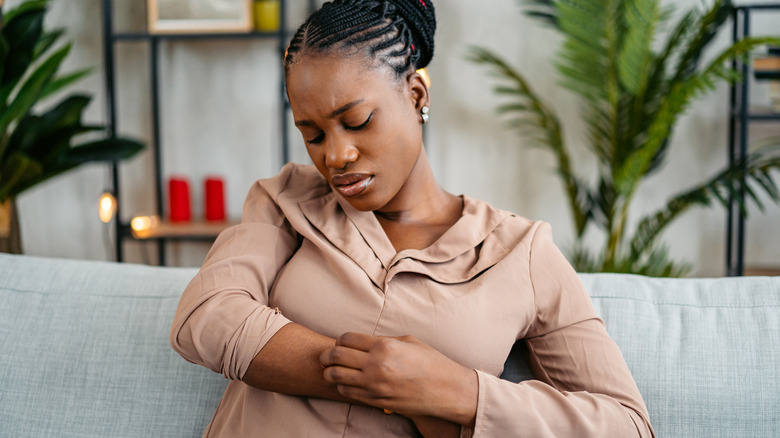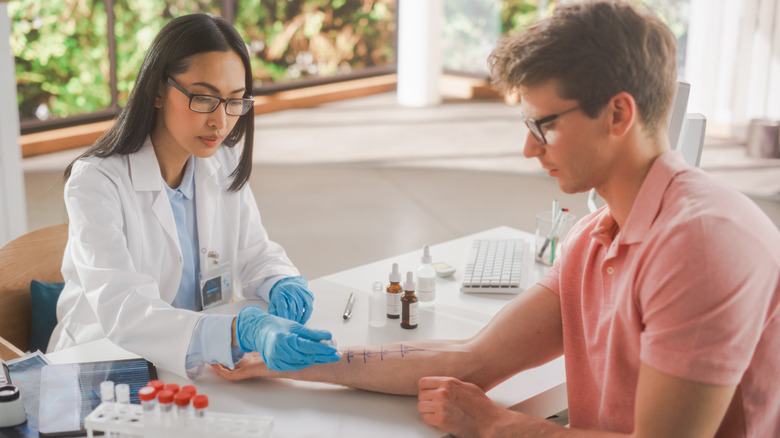What It Means When Your Multivitamin Makes You Itch All Over
Your body needs specific essential vitamins to function, like vitamins A, B, C, E, and K. According to the National Institute on Aging, most of the vitamins you need are obtained from your food. A balance of proteins, grains, and vegetables helps you meet your daily requirements. To make life a little easier, some people pop multivitamins daily to help fill the nutritional gaps they might be missing through their diet.
For example, calcium and vitamin D provided in a multivitamin help to strengthen bones in postmenopausal women, while vitamin B supports brain function in those over 50, per WebMD. Added folic acid is also needed by pregnant women to help prevent birth defects. Multivitamins are highly beneficial for those with conditions that lead to malabsorption, like celiac disease and gastric bypass surgery, since they can have trouble absorbing vitamins from food.
While the benefits of multivitamins are boasted all over the internet, they can also have irritating side effects, like an allergic reaction itch. This might come from a specific vitamin in the formula or a filler ingredient like soy or gluten. Learn the symptoms of an allergic reaction to your multivitamin and how to treat it. We'll also go over signs that require immediate medical attention.
Hives in reaction to a multivitamin
You easily pop your multivitamin in the morning and an hour later feel itchy all over your body. This reaction is known as hives. According to the Cleveland Clinic, hives are experienced by about 20% of the population at least once in their lifetime. The consumption or contact with an allergen triggers these raised welts.
Depending on the person, hives can present as itchy welts all over the entire body, creating red wheels, which are clearly defined swollen welts. Angioedema can occur when deeper tissue gets puffy and swollen. Itching and pressure can make the hives spread. The hives are triggered by the substance within the multivitamin, causing the immune system to release histamine into the blood, per Penn Medicine.
Since an immune system response causes the hives, take an antihistamine, like Benadryl, to help get the swelling and itch to subside. You can get rid of the hives once the drugs hit your system, and they'll stay gone if you avoid the allergen. Talk to your health care provider about the allergic reaction so testing can be run to ascertain what caused the allergic reaction.
When to see a doctor for an allergic reaction
Itchy hives on your body can be alarming, but it isn't going to leave any lasting effects. However, some allergic reactions to a multivitamin can progress into severe allergic reactions, known as anaphylaxis. This response typically takes place five to 30 minutes after taking the vitamin. Anaphylaxis can include hives and welts, but it also comes with severe swelling of the throat and other areas of the body.
The swelling becomes so severe it cuts off your air supply, leading to wheezing, chest tightening, trouble breathing, coughing, gasping, and passing out. Some people might also experience vomiting, diarrhea, stomach cramps, and pale skin, according to the American Academy of Allergy, Asthma, & Immunology.
If anaphylaxis is suspected, seek emergency medical treatment immediately or call 911. Treatment requires an epinephrine injection to calm the swelling and open up the throat. With the reaction under control, sufferers typically work with an allergist to narrow down what ingredient caused the severe reaction. Those who experience anaphylaxis typically carry an EpiPen in case of another severe reaction.



